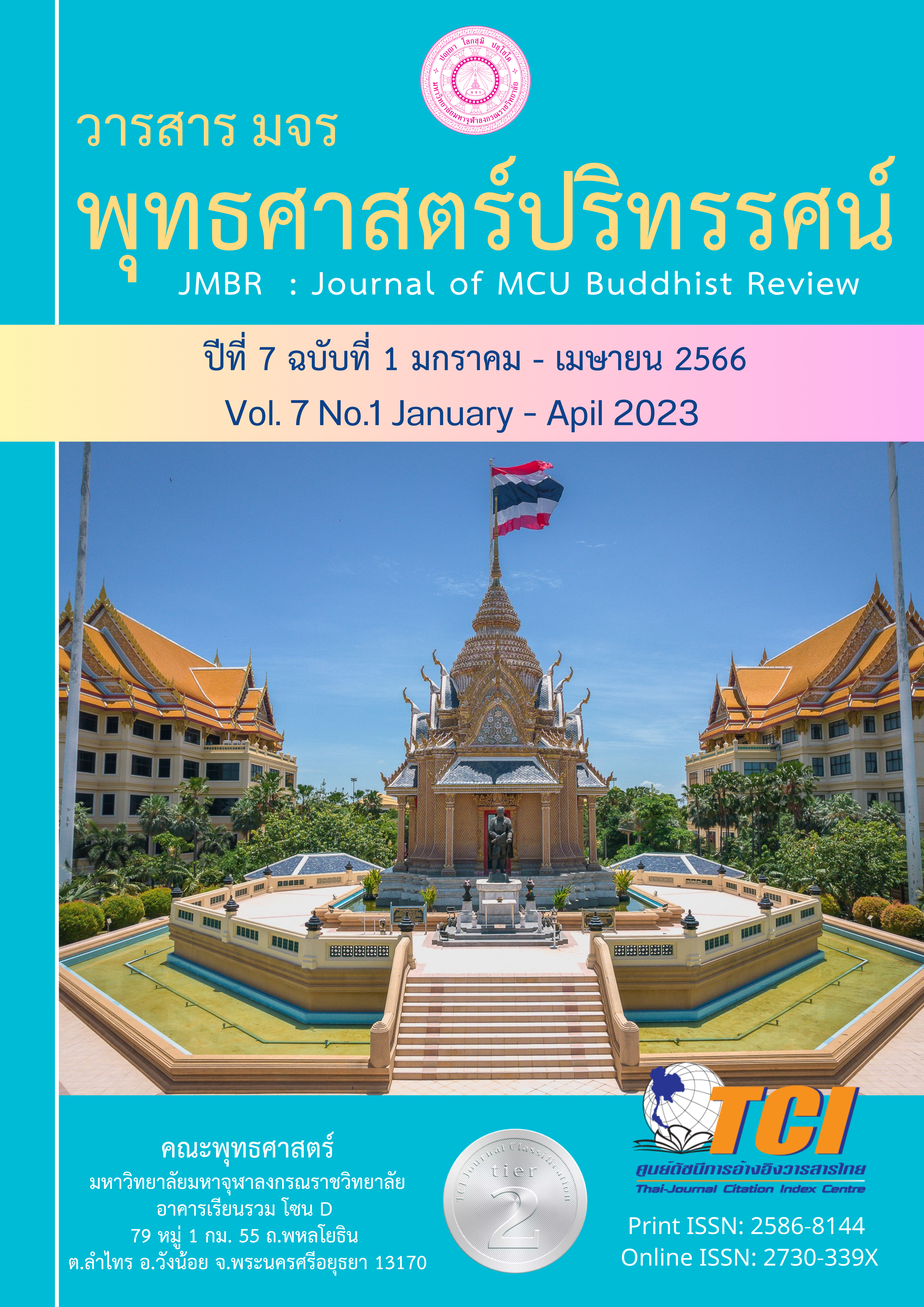ไตรลักษณ์: หลักแห่งความเสมอภาคในพระพุทธศาสนา
Main Article Content
บทคัดย่อ
บทความนี้มีวัตถุประสงค์เพื่อนำเสนอมโนทัศน์เกี่ยวกับหลักไตรลักษณ์ ซึ่งเป็นหลักแห่งความเสมอภาคในพระพุทธศาสนา และเพื่อให้ความสำคัญความเสมอภาคของมนุษย์ โดยใช้การศึกษาจากเอกสาร หนังสือและบทความที่เกี่ยวข้อง ผลการศึกษาพบว่า ความเสมอภาคในพระพุทธศาสนา แบ่งออกได้เป็น 2 ด้าน คือ ความเสมอภาคตามธรรมชาติ ที่เรียกว่า “ไตรลักษณ์” หรือ “สามัญลักษณะ” ซึ่งเป็นความเสมอภาคที่เป็นไปตามกฎของธรรมชาติ ที่มนุษย์ทุกรูปนามรวมทั้งสัตว์มีชีวิตทุกชนิดด้วยย่อมเสมอกันตามหลักสามัญลักษณะ อันได้แก่ อนิจจัง ทุกขัง อนัตตา และความเสมอภาคทางสังคม มีความเท่าเทียมกัน ไม่ดูถูกดูหมิ่นกัน ไม่เอารัดเอาเปรียบกัน ไม่เลือกที่รักมักที่ชัง ปฏิบัติสม่ำเสมอกันในชนทั้งหลาย โดยไม่เลือกเชื้อชาติ สีผิว ภาษา และศาสนา รวมถึงการช่วยเหลือเกื้อกูลซึ่งกันและกันสร้างความสัมพันธ์ต่อกันและนับถือกันให้มากขึ้นด้วย ซึ่งเป็นจุดมุ่งหมายของการสั่งสอนของพระพุทธเจ้าเพื่อการสร้างความยุติธรรม ความเสมอภาคของสังคม
Article Details

อนุญาตภายใต้เงื่อนไข Creative Commons Attribution-NonCommercial-NoDerivatives 4.0 International License.
- บทความที่ได้รับการตีพิมพ์เป็นลิขสิทธิ์ของวารสาร มจร พุทธศาสตร์ปริทรรศน์
- ข้อความใดๆ ที่ปรากฎในบทความที่ได้รับการตีพิมพ์ในวารสาร ถือเป็นความรับผิดชอบของผู้เขียนบทความ และข้อคิดเห็นนั้นไม่ถือว่าเป็นทัศนะและความรับผิดชอบของกองบรรณาธิการวารสาร มจร พุทธศาสตร์ปริทรรศน์
เอกสารอ้างอิง
จำนงค์ ทองประเสริฐ. (2520). พระพุทธศาสนากับสังคมและการเมือง. กรุงเทพฯ: แพร่พิทยา.
ณรจญา ตัญจพัฒน์กุล. (2564). Marxism ตายแล้ว ? : เราจะคืนชีพใหม่ให้ ‘มาร์กซ์’ ในศตวรรษที่ 21 ได้หรือไม่?. สืบค้น 7 เมษายน 2566 จาก https://www.the101.world/re-reading-marxism-in-21-st-century/
ปนัดดา รักษาแก้ว. (2564). การสร้างความเสมอภาคในสังคม: แนวคิด หลักการ บนฐานคิดธรรมาภิบาล. วารสาร มจร สังคมศาสตร์ปริทรรศน์. 10(1), 334-342.
ปรีชา เปี่ยมพงศ์สานต์. (2531). ธัมมิกเศรษฐศาสตร์: ปรัชญาเศรษฐศาสตร์สังคมของชาวพุทธ. กรุงเทพฯ: มิตรนราการพิมพ์.
มหาจุฬาลงกรณราชวิทยาลัย. (2539). พระไตรปิฎกภาษาไทย ฉบับมหาจุฬาลงกรณราชวิทยาลัย.กรุงเทพฯ: มหาจุฬาลงกรณราชวิทยาลัย.
พระมหาประสพฤกษ์ จารุวาโท (รัตนยงค์). (2550). “การศึกษาเชิงวิเคราะห์แนวความคิดเรื่องการบูชาในระพุทธศาสนา”. วิทยานิพนธ์พุทธศาสตรมหาบัณฑิต บัณฑิตวิทยาลัย: มหาวิทยาลัยมหาจุฬาลงกรณราชวิทยาลัย.
วิรัช ถิรพันธุ์เมธี. (2541). ดร.เอ็มเบ็ดก้าร์ รัฐบุรุษจากสลัม. กรุงเทพฯ: ดวงแก้ว.
วิรัช ถิรพันธ์เมธี. (254). พุทธปรัชญาการปกครอง. กรุงเทพฯ: ดวงแก้ว.
สมเด็จพระพุทธโฆษาจารย์ (ป.อ.ปยุตฺโต). (2564). พุทธธรรม ฉบับขยายความ. กรุงเทพฯ: ม.เอเชียอาคเนย์.
สมภาร พรมทา. (2539). ปรัชญาสังคมและการเมือง. พิมพ์ครั้งที่ 2. กรุงเทพฯ: จุฬาลงกรณ์มหาวิทยาลัย.
สุชีพ ปุญญานุภาพ. (2528). คุณลักษณะพิเศษแห่งพระพุทธศาสนา. กรุงเทพฯ: สำนักงานเสริมสร้างเอกลักษณ์ของชาติ สำนักเลขาธิการนายกรัฐมนตรี.
Plato. (1968). The Republic of Plato. Translated with notes and an interpretive essay by Allan Bloom. New York: Basic Book. Inc
Yarnall, T. F. (2000). Engaged Buddhism: New and Improved! (?) Made in the U.S.A. of Asian Materials. Religion Department: Columbia University.


